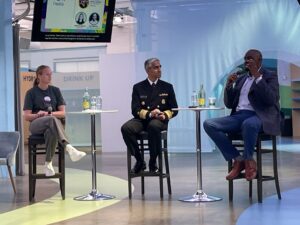In Part 1 of this blog series, we explored how at a recent panel hosted by Surgeon General Vivek Murthy, industry leaders Beth Barrett, Benjamin Gibbard, and J. Kenji López-Alt discussed the roles of cinema, music, and food in combating loneliness and isolation. In this post, we will delve into the second panel at the event, featuring the personal journeys of Seattle sports icons Bethany Balcer and Ray Roberts, who shared their experiences navigating professional sports and mental health.

Overcoming Challenges
Surgeon General Vivek Murthy opened the panel by asking the panelists to speak about their personal journeys. Ray Roberts spoke about his difficult upbringing, how he had a plethora of bad role models to inform him of how “not to be” and how several mentors stepped in to help him on a path to success. Teachers helped him with both material and emotional support.
Bethany Balcer shared her experience discovering her mental health challenges in the midst of professional sports expectations. She discussed her imposter syndrome and her panic attacks, and her healing journey through therapy and an increased reliance on others. The sports community she is a part of have been receptive and supportive for her.
Ray Roberts reflected that when he first discovered his depression, many years ago when he was playing professionally in Detroit, the sentiment was that mental health services were for the “crazy or broken” people. As a professional sports player, he was empowered to visit a therapist, but was told to visit the therapist in downtown Detroit at night so no one would see him.
Both emphasized the importance of authenticity and vulnerability in building strong social connections. Murthy highlighted how wearing a mask to hide our true selves can be exhausting, stressing the need for genuine interactions. (This is especially relevant during Pride Month!)
Build Social Muscles Like Other Muscles
When asked to offer some advice to the audience, both advised that it can be challenging to build our social muscles. When we don’t use them, they get weak, but just as people go to the gym to improve physical muscles, and it can sometimes be painful to use muscles we haven’t used in a while, we must continue to exercise them so they get stronger. It will get easier over time.
Key Takeaways
Here are some key insights from the second panel of the night:
- Lower the mask: Authenticity and vulnerability are two sides of the same coin, and can be tremendous bulwark against stress and pain when used to connect with communities of care.
- Encourage open conversations: Both panelists shared how supported they felt when others were able to see them amidst their mental health challenges. Help destigmatize and reduce the shame around mental health by making it normal to receive mental health support.
- Be a Mentor: Balcer and Roberts both shared how people in positions of authority in their lives, coaches, teachers, and elder teammates, had provided guidance and support when they needed it. We can offer this kind of communal support to others.
- Flex the Social Muscles: It may take time. It may be awkward or even painful at times, but it will be immensely rewarding when we (re)build our social muscles and connect with others in supportive community.
I’ll follow up in a future post with thoughts on the combined total of the event, and how well-played games, which were not mentioned during the event(!), could be a perfect framework for reconnecting with community in accessible, safe, fun, and repeatable ways.
If you’d like to be kept up to date on all things Game to Grow, join our newsletter here.
